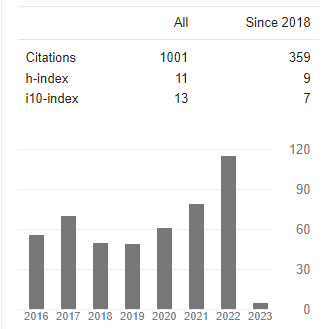Peer Review Policy, Refree Report & Ethical Guidelines for Reviewers
Peer review must often seem like a thankless task, but without it The IJEMS could not survive. We depend on our reviewers to help us assess the quality and usefulness of the hundreds of manuscripts we receive each year. We ask reviewers to help us prioritise the manuscripts that we receive, bearing in mind that The IJEMS aims to publish original, important, and reliable articles that will help our readers around the world - who are mainly doctors - to make better decisions about practice, policy, education, and research.
The submitted manuscripts are assessed by a Triage/Screening Editor for originality of work, scientific adequacy and plagiarism. The manuscripts that fall within the scope of the journal and have a acceptable quality are assigned to a minimum of 2 external reviewers for peer-review. In the peer-review process both the authors and reviewers identities are concealed from each other to ensure a high-quality, fair, and unbiased peer-review process of every manuscript submitted to the journal. The assigned reviewers are given one to two weeks to respond to the review mail and further one week to review the manuscript. The average time for manuscript review takes around 3-4 weeks under regular submission. The reviewers submit their reports to the Editor for further processing.
The manuscripts are then considered for possible publication on the understanding that they are being submitted only to one journal at a time and have not been published, simultaneously submitted, or accepted for publication elsewhere. Then the article is assessed and the author is informed if the article has been accepted for peer review or has been rejected. If rejected, the corresponding author will be informed via an email.
When all reviewers have submitted their reports, the Editor can publish the manuscript unaltered, consider after minor/major changes or reject the manuscript. In case, changes as suggested by the reviewers, the authors are notified to prepare and submit a final copy of their manuscript with required amendments. The revised manuscript is reviewed after the changes have been made by the authors and accepted if it meets the publication ethics and author guidelines.
The editorial workflow gives the Editors the authority to reject any manuscript because of inappropriateness of content, inadequate quality, or inaccuracy in results.
Type of peer review This journal employs single blind reviewing, where the referees remain anonymous to authors throughout the process. Authors, however, are not anonymous to reviewers.
How referees are selected Referees are matched to papers according to their expertise and recent reviewing history. Our database is constantly being updated. We welcome suggestions for referees from the author(s) though these recommendations may or may not be used.
Referee reports
Referees are asked to evaluate whether the manuscript:
• is original
• is methodologically sound
• follows appropriate ethical guidelines
• has results which are clearly presented and support the conclusions
• correctly references previous relevant work
Blind Peer Review
The IJEMS has fully blind peer review for all articles which means the names are not disclosed. We ask reviewers to sign their reports and declare any competing interests on any manuscripts we send them.
In addition, accepted research and analysis papers will usually have their prepublication history posted alongside them on IJEMS. This prepublication history generally comprises all previous versions of the manuscript, the study protocol (mandatory for all clinical trials and encouraged for all other studies at The IJEMS), the report from the manuscript committee meeting, the reviewers’ comments, and the authors’ responses to all the comments from reviewers and editors. The prepublication history will be posted at the same time the paper is published and you can find it under the ‘peer review’ tab of an article.
For rejected papers, we expect that authors will keep the identity and comments of peer reviewers confidential. They may, however, share the peer review comments (though not peer reviewer names) in confidence with other journals. Authors should contact the editor who handled their paper if they have any complaints about the peer review process or the behaviour of the peer reviewers. Authors should not contact reviewers directly to discuss their reports; all queries should be directed through the editorial office.
As a reviewer you will be advising the editors, who make the final decision (aided by an editorial committee for all research articles and most analysis articles). Reviewers will be informed of decisions by email. If we do not accept an article we will still pass on reviewer comments to the authors.
You will remain the owner of the review you submit to us. It is your responsibility to ensure that you obtain the consent of any co-reviewer or other third party who may have contributed to your review. In submitting your review to The IJEMS you are agreeing to licence your work to us so that we may use it for the purposes outlined below. If published, your review will be published under the same license as the article.
An author’s manuscript must remain confidential until it is published, and you must not disclose any information about an unpublished manuscript, including your review. Please note that if the article is not published you may refer to the journal which requested your review and the fact that you have reviewed an article for it. However, you may not post any details of the article which was reviewed, or any part of the review that would breach the confidentiality under which the article was provided to you for review.
Authors are given the option of nominating other journals from THE UNIVERSITY ACADEMICS to which they would like their manuscript transferred to if it is rejected by The IJEM. If the author of the manuscript you reviewed has taken up this option, your review will be passed on to the editor of the nominated journal along with the manuscript and you might be invited to review a revised version. If the article is accepted for publication in the other THE UNIVERSITY ACADEMICS journal, your review may also be published (depending on the editorial policy of the journal in question). You will be contacted for your permission before this happens.
We provide a thank you email once your review is complete. We are not able to provide any additional documentation regarding your review.
Become a peer reviewer
We are always looking for new peer reviewers. If you would like to volunteer, please register for an account at our online editorial office to be added to our reviewer database. When you have created an account, fill in details such as keywords and special interests to show up in our reviewer database searches.
We invite even students to review manuscripts for Students. If you are a student or newly qualified PG graduate, please include the term “student” under special interests in the personal information area of your account.
We are constantly trying to find ways of improving our peer review system and have an ongoing programme of editorial research. For example, The University Academic editors and researchers have conducted randomised controlled trials on peer review and on peer review training. We hope that The IJEMS reviewers will also be committed to improving peer review. If you would like to opt out of involvement in such research please let us know by emailing us mentioned in the contacts or directly contacting Editor-in-Chief IJEM Dr.Mandeep Singh (+91-9906365952)
Writing a review
Once signed up as a reviewer, you will become part of our reviewer database. If we need your help with appraising a manuscript we will email you and ask you to accept or reject the invitation. If you cannot review the manuscript and would like to suggest an alternative reviewer, please reply to the invitation email to let us know.
If you feel qualified to judge a particular manuscript, you should agree to review only if you are able to return a review within the proposed or mutually agreed time-frame. If you cannot review, it is helpful to make suggestions for alternative reviewers if relevant, based on their expertise and without any influence of personal considerations or any intention of the manuscript receiving a specific outcome.
During the review process we ask you to declare any potentially conflicting or competing interests (which could be personal, financial, intellectual, professional, political or religious in nature) so that editors can assess these and factor them into their decisions. Please refer any major concerns over potentially competing interests to the editorial office before beginning your review. In addition, you should not agree to review a manuscript just to gain sight of it with no intention of submitting a review. For more information on conflicts of interest, please refer to the section further down this page.
Manuscripts submitted to journals are authors’ private, confidential property; reviewers should keep manuscripts and the information they contain strictly confidential. If you do choose to discuss the manuscript and/or your review with a professional colleague whose input you request as part of your review process, you are responsible for ensuring that they are made fully aware of the confidential nature of the discussion and that they must not disclose any information about the manuscript until the article is published. The identity of any co-reviewer and any potential conflicting or competing interests they may have must be disclosed when submitting your review. Reviewers should not retain the manuscript for personal use and should destroy copies after submitting their review.
As a reviewer you must provide a fair, honest, and unbiased assessment of the strengths and weaknesses of the manuscript. For example, be specific in your critique, and provide supporting evidence with appropriate references to substantiate general statements. Be professional and refrain from being hostile or inflammatory and from making libelous or derogatory personal comments. If the work is not clear because of missing analyses, the reviewer should comment and explain what additional analyses would clarify the work submitted. It is not the job of the reviewer to extend the work beyond its current scope.
Some types of articles need more specific appraisal, and you may find it useful to look at our checklists. Reviewers should consider for all articles:
- Is the article important?
- Will it help our readers to make better decisions and, if so, how?
- Will the article add enough to existing knowledge?
- Does the article read well and make sense? Does it have a clear message?
Specifically for research articles:
- Originality - does the work add enough to what is already in the published literature? If so, what does it add? Please cite relevant references to support your comments on originality.
- Importance of the work to general readers - does this work matter to clinicians, researchers, policymakers, educators, or patients? Will it help our readers to make better decisions and, if so, how? Is a general medical journal the right place for it?
- Is the research question clearly defined and appropriately answered?
- Overall design of study - appropriate and adequate to answer the research question?
- Participants - adequately described, their conditions defined, inclusion and exclusion criteria described? How representative were the authors of patients whom this evidence might affect?
- Methods - adequately described? Main outcome measure clear? Is the study fully reported in line with the appropriate reporting statement or checklist
- Results - answer the research question? Credible? Well presented?
- Interpretation and conclusions - warranted by and sufficiently derived from/focused on the data? Discussed in the light of previous evidence? Is the message clear?
- References - up to date and relevant? Any glaring omissions?
- Abstract/summary/key messages/what this paper adds - reflect accurately what the paper says?
- Documents in the supplemental files. Do these properly match what is in the manuscript? Do they contain information that should be better reported in the manuscript, or raise questions about the work?














